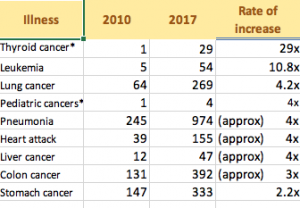**Inquiries have been made to Minamisoma Municipal General Hospital as to the precise meaning of the numbers they released. Further responses will be posted on this site.**
(Data on leukemias, cancers, and a few other select illnesses obtained by Minamisoma City Councilperson Oyama Koichi and confirmed by attorney Ido Kenichi with the hospital. All text translated by Norma Field with two notes. )
[CLICK on charts to expand]
*Adult thyroid cancers only; youth and pediatric thyroid cancers are meant to be the responsibility of the Fukushima Prefectural Health Survey. For updates, see Fukushima Voice Version 2e.
**Pediatric cancers include brain tumors, neuroblastoma, kidney cancer, etc.
Ido is the lead attorney in the Children’s Trial against Radiation Exposure. About the recent data released by Minamisoma Municipal General Hospital, he comments as follows: “I am concerned that Fukushima is faced with the prospect of spreading damage to health, just like Chernobyl. Neither the central government nor the prefecture, however, has attempted to pursue health effects other than pediatric thyroid cancer. […] The data Councilperson Oyama has secured is, to be sure, but a small sample, and we must be careful about generalizing from the data of a single hospital. We should also be considering the impact of the closures and downsizing of neighboring health facilities, the aging demographic, the physical and psychological fatigue resulting from the tsunami and nuclear accident, as well as stress. Still, outpatient visits numbered 82954 in 2010, and 81812 in 2017–in other words, no increase. Those 65 and over in the city numbered 18809 in 2010, 18452 in 2017, again showing no increase. As for stress, it seems plausible that it was more serious in the early stages. What is certain is that patient numbers have steadily risen. We attorneys for the Children’s Trial against Radiation Exposure intend to present this evidence at the next oral argument on October 16 in order to raise this issue.” (See here.)
◇Patient data from Minamisoma to be presented as evidence at trial (via Our Planet-TV)
[…] Following the nuclear accident, both the population and number of hospital beds declined by half in Minamisoma. Inpatient and outpatient numbers at the municipal general hospital exceeded 62,000 in 2010, but in 2015, decreased to under 50,000. For this reason, the legal team argue that it is difficult to attribute the increase in illnesses at the municipal general hospital to the decrease in number of health facilities in the city of Minamisoma. […]
Kenichi Ido, lead attorney for the plaintiffs, explains that “The principal point of contention in this trial is whether the prevailing conditions of exposure in Fukushima pose a risk to children or not. Given that both the central government and Fukushima Prefecture have neglected to investigate health conditions, and that all we have are the results of the Prefectural Health Survey of [youth and pediatric] thyroid cancers, we have been extremely frustrated.” He explained the significance of the current disclosure thus: “We finally have data showing one aspect of our current reality, and we intend to introduce them in the trial to call attention to this issue.” Going forward, he will be urging general hospitals in municipalities other than Minamisoma to investigate their records and make public data on the shifts in patient numbers.”
◇See Part 1, data on illnesses other than cancer for same time period
◇Japanese post of Part 2 here







The Minamisoma city council verified with the Minamisoma Municipal General Hospital business office that the data in question represents cumulative patient visits. Once a patient is registered through the hospital system with a certain diagnosis, subsequent visits are counted cumulatively for accounting purposes unless the patient’s information is removed from the system due to reasons such as death or transfer to another hospital. The city council chair has issued a written warning to the city council member Koichi Oyama who originally disseminated the data. (Source: Hirono town council member, Kenichi Abe)